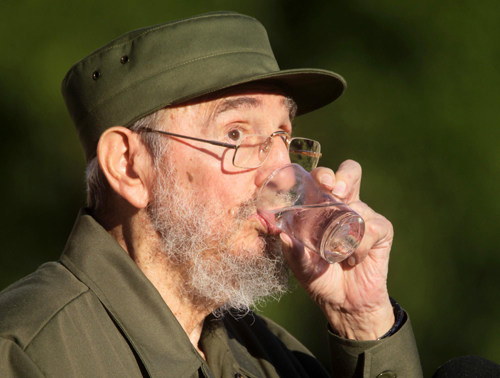Newsmaker
Fidel Castro bounces back
(China Daily)
Updated: 2010-09-05 08:03
 |
Large Medium Small |
HAVANA - Cuba's Fidel Castro said he felt "revived" after a serious illness and said he still has "things to do", the official website Cubadebate reported last week.
 File photo shows former Cuban leader Fidel Castro drinks water during a meeting with students at Havana's University September 3, 2010. [Photo/Agencies] |
"I came to be dead ... I no longer aspired to live, much less ... I asked several times if these people (his doctors) would let me live in these conditions or I would be allowed to die ...
During a five-hour meeting, Castro, 84, recalled the severe intestinal disease he suffered in July 2006, which forced him to delegate the presidency for the first time after 47 years in office.
Castro added that after leaving the hospital he found "a crazy world" that "no one could understand" but that he "had not wanted to lose."
"I do not want to be absent in these days. The world is in the most interesting and dangerous phase of its existence and I'm pretty committed to what will happen. I still have things to do," he said.
"We need to mobilize the world to persuade US President Barack Obama to avoid a nuclear war. He is the only one who may or may not push the button," Castro said.
The former leader had warned several times of a possible nuclear war if the United States attacks Iran.
Castro, who is around 1.9 meters tall, also revealed that after his illness he only weighed 66 kgs.
"But now I weigh between 85 and 86 kg. And this morning I walked 600 steps, without crutches, without support."
Since Castro returned to public life on July 7, he has held several meetings with leaders, politicians, journalists and artists, focusing on a "nuclear war deriving from a US attack on Iran."
Although he handed over power to his brother Raul, Castro keeps his influence in Cuba as the first secretary of the Cuban Communist Party's Central Committee.
In another interview last week, Castro took the blame for a wave of homophobia launched by his revolutionary government in the 1960s.
But he said it happened because he was distracted by other problems.
The former Cuban president told La Jornada that the persecution of gays, who were rounded up at the time as supposed counter-revolutionaries and placed in forced labor camps, was a "great injustice" that arose from the island's history of discrimination against homosexuals.
He said he was not prejudiced against gays, but "if anyone is responsible (for the persecution), it's me."
"I'm not going to place the blame on others," he said.
Castro said he was busy fending off threats from the United States in those days, including attempts on his life, and trying to maintain the revolution that put him in power in 1959.
"We had so many and such terrible problems, problems of life or death," Castro said.
"In those moments, I was not able to deal with that matter (of homosexuals).
"I found myself immersed, principally, in the Crisis of October (Cuban Missile Crisis), in the war, in policy questions," he said.
Official persecution of gays continued into the 1970s before homosexual acts were decriminalized in 1979.
Today, Cuba's medical service provides free sex-change operations.
Cuban media reported on Tuesday that he went to the National Aquarium and watched a dolphin show with US-based writer Jeffrey Goldberg, Julia Sweig of the Council on Foreign Relations think tank in Washington and Adela Dworin, leader of Cuba's Jewish community.



